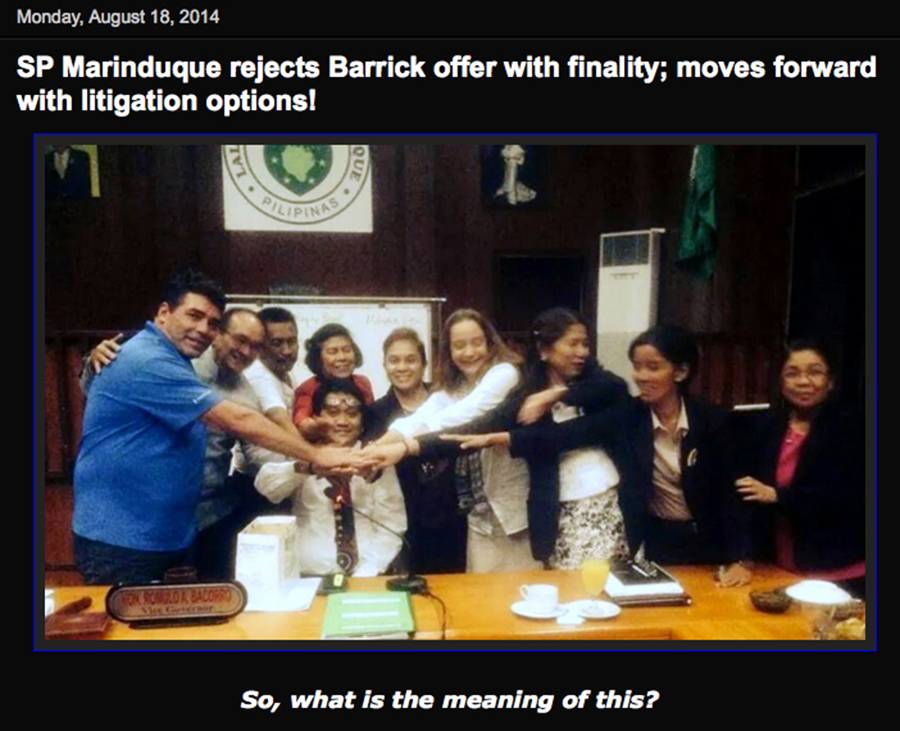In August, I was invited to travel to Marinduque Island in the Philippines to meet with civil society organizations, municipal elected officials, and the elected Provincial Board. The topic on people’s minds was a long-running lawsuit pitting the Provincial Board against Canadian mining giant Barrick Gold. The case, filed in the state of Nevada in 2005, is at a crossroads and it may be re-filed in Canada. Marinduqueños sought my assistance in considering their options.
I participated in four separate meetings with in total some 140 people. The meetings were facilitated by a handout (attached) that sets out the basic background of the case and the four options facing the Province.
The case was filed with the District Court in Nevada in October 2005, on behalf of the Provincial Government of the Island of Marinduque, Philippines, against Canadian mining company Placer Dome Inc. In 2006, Canadian mining company Barrick Gold Corp. acquired Placer Dome and became a party to the lawsuit. The Province brought the case in its sovereign capacity and as parens patriae (protector) to all Marinduqueños. The Province asserted that Placer Dome is responsible for serious environmental degradation to Marinduque caused by nearly three decades of mining, with consequent economic damages and impacts to the health of people living in the vicinity of the mine and its waste. The Marcopper mine was partly owned, and operated, by Placer Dome. The Province sought an unspecified amount of damages (including exemplary damages, interest and attorneys’ fees) and orders from the District Court requiring PDI to complete an environmental clean-up of the affected lands and water systems (including the reintroduction of harmed species into the restored environment), repair the deteriorating Marcopper mine structures, and create and fund environmental and medical monitoring.
In February 2011, the Nevada district court judge dismissed the case on the basis of Forum non Conveniens (that the US is the wrong jurisdiction to hear the case), arguing that Canada is a more appropriate forum (Barrick is headquartered in Toronto). The judge noted that if the Province re-filed the case in Canada, he would impose conditions favourable to the Province including that: 1) Barrick cannot ask for dismissal of the case from Canada based on Forum non Conveniens; 2) Barrick has to agree not to seek dismissal on the basis of statutes of limitations post October 4, 2005, when the case was originally filed; 3) Barrick must admit that the Canadian legal system permits monetary damages, as well as equitable relief.
At this juncture the parties agreed to stay proceedings and attempt mediation to seek a settlement on which they could agree. Between 2011 and 2014 mediated settlement negotiations took place. In 2013, Barrick presented the Province a settlement offer that raised serious concerns expressed publicly in joint resolutions and petitions by many Marinduqueños, including elected officials and provincial board members. Concerns included a settlement offer that fell far below the amount needed to clean up decades of environmental damage, and restrictions on the use of funds, including a prohibition on using the funds to clean up ecosystems contaminated by mine waste.
Barrick did not address concerns of the Province. After numerous deadlines were extended without a settlement, the Nevada Supreme Court lifted the “stay” on the court proceedings in July of 2014. The Province’s appeal is now proceeding before the Nevada Supreme Court. The Province is arguing that the case remain in Nevada, or, if it is dismissed, that it be dismissed to the Philippines with conditions similar to those imposed on Barrick by the district court of Nevada in 2011.
If the Supreme Court of Nevada upholds the lower court ruling, the Province will have the opportunity to re-file the lawsuit in Canada. While in Marinduque, Catherine was asked at her meeting with the Provincial Board to assist the Province in seeking legal representation in Canada in case suit is dismissed in Nevada in favour of Canada.
